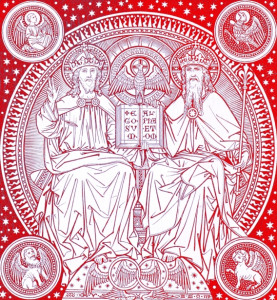 Even though Easter and Christmas seem to get all the attention, the Christian Church has a number of other important holy days during the year. Trinity Sunday and the Feast of Corpus Christi, also known as the Corpus Christi Festival, are two such occasions. Both holidays are moveable feasts, meaning they take place on different dates each year but around roughly the same time. Trinity Sunday always occurs right after Pentecost Sunday and in 2015 falls on May 31. The Corpus Christi Festival is celebrated the Thursday following Trinity Sunday.
Even though Easter and Christmas seem to get all the attention, the Christian Church has a number of other important holy days during the year. Trinity Sunday and the Feast of Corpus Christi, also known as the Corpus Christi Festival, are two such occasions. Both holidays are moveable feasts, meaning they take place on different dates each year but around roughly the same time. Trinity Sunday always occurs right after Pentecost Sunday and in 2015 falls on May 31. The Corpus Christi Festival is celebrated the Thursday following Trinity Sunday.
Trinity Sunday
Trinity Sunday commemorates the Holy Trinity, also referred to as the Father, Son and Holy Spirit. The concept of the Trinity can be a little confusing. Some people believe it is above human comprehension and the only way to truly grasp the meaning is through worship and devout faith. The symbol of the Trinity does not stand for three separate persons. However, Christians are taught the Father, Son and Holy Spirit are unique but have a common desire and significance.
History
The concept of the Trinity has been an important part of the Christian religion since its inception. In the beginning, it was not celebrated as an official holiday. In 1334, Pope John XXII formally established Trinity Sunday as a feast day. The date His Holiness picked is still observed today.
Biblical References to the Trinity
There are numerous Biblical references to the Trinity including:
- Matthew 28:18-20
And Jesus came and said to them, “All authority in heaven and on earth has been given to me. Go therefore and make disciples of all nations, baptizing them in the name of the Father and of the Son and of the Holy Spirit, teaching them to observe all that I have commanded you. And behold, I am with you always, to the end of the age.”
- Corinthians 13:14
“The grace of the Lord Jesus Christ and the love of God and the fellowship of the Holy Spirit be with you all.”
Corpus Christi Festival
The Corpus Christi Festival is the day Christians honor Corpus Domini (Latin for “Body and Blood of Jesus Christ”). The main intention of the holiday is to acknowledge and honor Christ’s suffering, death and resurrection through the taking of the Eucharist, also called Holy Communion. Celebrations for the occasion vary by Christian denomination and region of the world. It is a particularly significant date in the Catholic Church and is one of only five days of the year that diocese bishops must be present in their diocese, which is the region under their supervision.
Catholics mark the date with a procession in the streets, typically around parish churches. The Feast of Corpus Christi is a public holiday in Poland, and in Brazil people don colorful costumes to commemorate the occasion. It is considered a major holy day in the Anglican Church but not widely celebrated. The Church of England refers to it as “The Day of Thanksgiving for the Institution of Holy Communion.”
History
The origin of the Corpus Christi Festival is largely attributed to St. Juliana of Liege, who lived in the 13th century in Liege, a French-speaking region of Belgium. She was a committed Catholic and lived in a community of other religious women. St. Juliana reportedly had a vision of Christ that told her to appeal to the powers within the Church to establish the feast of Corpus Christi. In acknowledgement of its significance, it was only one of two feast days Pope Pius V, who lived from 1504-1572, kept when he revised the General Roman Calendar, which was the official Church calendar of the time.
Trinity Sunday and the Feast of Corpus Christi are significant days in the Christian religion and commemorated in a variety of ways.

